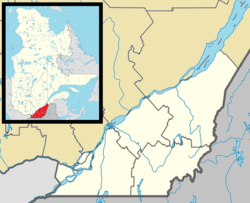Saint-Jean-Port-Joli, Quebec
| Saint-Jean-Port-Joli | |
|---|---|
| Municipality | |
 |
|
 Location within L'Islet RCM. |
|
| Location in southern Quebec. | |
| Coordinates: 47°13′N 70°16′W / 47.217°N 70.267°WCoordinates: 47°13′N 70°16′W / 47.217°N 70.267°W | |
| Country |
|
| Province |
|
| Region | Chaudière-Appalaches |
| RCM | L'Islet |
| Constituted | July 1, 1855 |
| Government | |
| • Mayor | Jean-Pierre Dubé |
| • Federal riding | Montmagny—L'Islet— Kamouraska—Rivière- du-Loup |
| • Prov. riding | Côte-du-Sud |
| Area | |
| • Total | 240.90 km2 (93.01 sq mi) |
| • Land | 68.95 km2 (26.62 sq mi) |
| Population (2011) | |
| • Total | 3,304 |
| • Density | 47.9/km2 (124/sq mi) |
| • Pop 2006-2011 |
|
| • Dwellings | 1,658 |
| Demonym(s) | Port-Jolien(ne) |
| Time zone | EST (UTC−5) |
| • Summer (DST) | EDT (UTC−4) |
| Postal code(s) | G0R 3G0 |
| Area code(s) | 418 and 581 |
| Highways |
|
| Website | www portjoli |
Saint-Jean-Port-Joli is a village in the Regional County Municipality of L'Islet within the Chaudière-Appalaches region of Quebec, Canada. It is located on the south shore of the Saint Lawrence River and is the county seat. The village is located off the Trans-Canada Highway, Autoroute 20. Route 132 passes through the town.
It is known for its craftspeople and artists, especially in the fields of wood carving and sculpture. There are also several well-reputed restaurants.
The village takes its name from the seigneury of Port-Joly, which was established in 1677. The Parish of St-Jean-Port-Joli was canonically established in 1721. The church, on which construction began in 1779, has unique architecture and houses many sculptures. The municipality was created in 1845 and became part of the RCM of L'Islet in 1847. In 1855, it became a parish municipality, and in 1857 it was split into the municipalities of St-Jean-Port-Joli and Saint-Aubert.
Like most other villages that lie in the Côte-du-Sud region between Rivière-Ouelle and Beaumont, most of its houses were burned down in September 1759. Under the orders of British general James Wolfe, the Fraser Highlanders regiment attacked the area during the Conquest of 1760 during the French and Indian War.
...
Wikipedia

